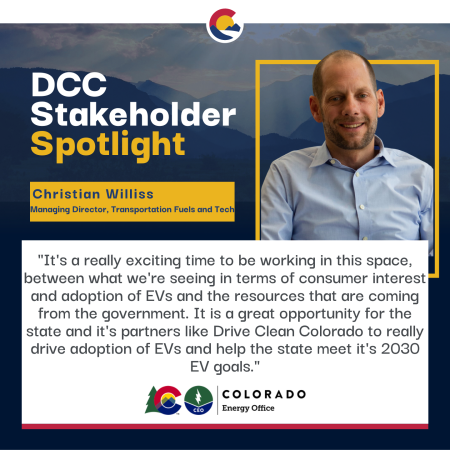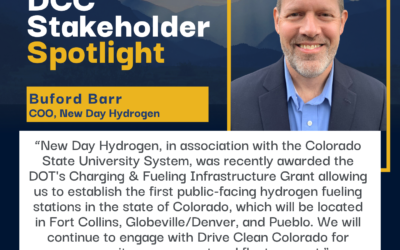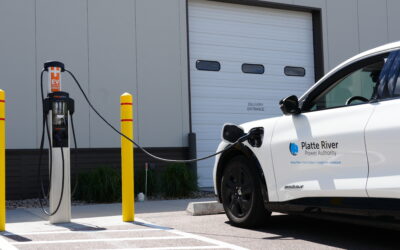We sat down with Christian Williss, Managing Director of Transportation Fuels and Technology at the Colorado Energy Office, to discuss clean transportation in the state and highlight some important programs that the CEO is working on.
*The following interview is a transcription of an interview held with Williss.
Can you describe your role with the Colorado Energy Office?
As part of the transportation team, our focus is primarily electrification, including electric vehicles, although we’re also supporting the state’s application for the hydrogen hub and increasingly doing work around e-mobility as well.
The CEO has a few different programs focusing on clean transportation in the state. How can these programs assist in advancing clean transportation in Colorado?
We have a number of different types of programs. The programs that folks know best are our infrastructure grant programs. We’ve managed a program called Charge Ahead Colorado for about 10 years and it provides grants for community-based level 2 and DC fast charging stations.
We also did a one-time funding opportunity to build out high-speed charging along our major transportation corridors back in 2018 and we should be wrapping up that project this year. We have 30 of 34 locations open. We just launched the most recent round of the Plaza program. Plaza is where the state’s NEVI formula funds will be flowing, so we are looking to build high-speed charging along our corridors as well as in communities across the state. Finally, we’ll be launching a fleet charging program, targeting early May for that funding. This will target primarily medium and heavy-duty fleets, but some for light-duty fleets as well.
For a number of years now we have been providing grants for electric bicycles; we were provided some money in 2021 by the legislature to expand that program, which traditionally provided bikes at no cost to low-income essential workers, to low- and moderate-income Coloradans around the state as well. We will also be launching a rebate program sometime this summer. Finally, I’d say our other program is the vehicle exchange program which is also launching this summer; that will provide incentives for low- and moderate-income Coloradans that give up their high-emitting conventional vehicle and use the rebate to purchase a new or used electric vehicle.
I think together those programs are helping to address a number of the barriers that Coloradans face in making the transition to electric vehicles. One [of these barriers] is access to public charging infrastructure; the second is helping to reduce that upfront cost for an EV and then the third real barrier is that lack of awareness about electric vehicles and so we also launched a multi-year brand awareness campaign called EV-CO with a website, targeted media, and is designed to help people better understand the barriers of charging and upfront cost of EVs.
Are there any of these programs that you would like to dive into a little more?
Our partnership with Drive Clean Colorado is rooted in the ReCharge Colorado program. This is a program that has been around since 2013, and it’s certainly evolved over the years just as the industry has evolved. It really started with a greater focus on compressed natural gas as a fuel alternative, actually, and then over time has transitioned to focus exclusively on electrification. It traditionally focused on making sure that people understood the opportunities that are available to address electrification barriers.
We have found over the last year that between our efforts at the state and the partnership with ReCharge Colorado, the participation in Charge Ahead Colorado has really grown to a point where we get many, many more applications than we can fund. We also know that the coaches spend an inordinate amount of time providing support to potential applicants, and we are really excited about the progress that we’ve made; we are looking at how to continue leveraging this opportunity that we have to meet directly with consumers and site hosts to ensure that we’re really providing the support to those potential applicants that most need it.
Can you touch on what CEO is doing for underserved communities and how your programs are able to serve them?
This is a major priority for the state as well as for the energy office and the transportation team; we’re doing a number of things that we hope make it easier for those who traditionally have been unable to participate in our programs participate, and really opening up the opportunity to benefit from this transition to electric vehicles.
As far as Charge Ahead Colorado goes, we recently made some improvements to the program that will help to increase access. We have an incentive that is now available to site hosts that provide a community service like a library, rec center, or House of worship, to install a charging station. We will provide an enhanced incentive. We also provide an enhanced incentive for multifamily housing facilities that serve income-qualified tenants. We also need to make sure people have the support they need to apply for these incentives and have recently issued purchase orders to two vendors to help us do better at engaging with these communities, both in terms of making sure that they understand these programs exist, and making sure that people have the support they need to apply for the programs. One of these vendors is working very closely with the ReCharge coaches and the second vendor is helping with stakeholder engagement directly with disproportionately impacted communities to ensure that the programs that we’re designing are meaningful and fully utilized.
Wiliss ended our discussion by saying “It’s a really exciting time to be working in this space, between what we’re seeing in terms of consumer interest and adoption of electric vehicles and the resources that are coming from the state and federal government. It is a great opportunity for the state and its partners like Drive Clean Colorado to really drive adoption of electric vehicles and help the state meet its 2030 electric vehicle goals.”
Contact Information
Christian Williss, Managing Director of Transportation Fuels and Technology at the Colorado Energy Office
Email: christian.williss@state.co.us






